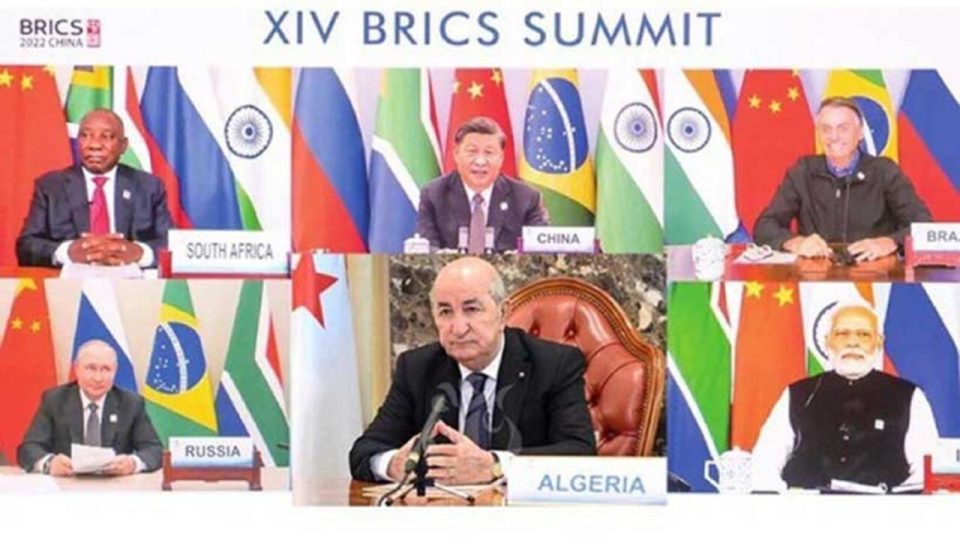UAE’s $10 Billion Contribution to BRICS Bank: to include Egypt and exclude Algeria
The recent decision by the United Arab Emirates (UAE) to provide a substantial $10 billion contribution to the BRICS Bank, with the intention of adding Egypt while excluding Algeria from the list of countries, has stirred a significant amount of attention and debate. While the UAE claims to support fairness and inclusivity, the move has raised questions about the criteria for BRICS membership and the implications for the broader geopolitical landscape. This article delves into the motivations behind the UAE’s decision, the rationale for adding Egypt, and the concerns surrounding Algeria’s exclusion.
UAE’s Financial Contribution and BRICS Expansion
The BRICS Bank, officially known as the New Development Bank (NDB), was established to promote infrastructure and sustainable development projects in member countries and other emerging economies. The UAE’s sizeable financial contribution to the bank highlights its interest in fostering economic growth and collaboration within the BRICS framework.
The Inclusion of Egypt
The addition of Egypt to the BRICS group, facilitated by the UAE’s contribution, signifies a significant expansion of the alliance’s scope. Egypt, with its historical significance, regional influence, and economic potential, aligns with the BRICS nations’ shared objectives of promoting emerging economies. The inclusion of Egypt could lead to enhanced trade relations, investment opportunities, and technological exchange, benefiting not only Egypt but the entire BRICS consortium.
Algeria’s Exclusion: A Controversial Decision
Algeria, often seen as a pivotal player in the African continent due to its historical ties, economic prowess, and diplomatic influence, has been left out of this expansion effort. Critics argue that Algeria’s omission raises concerns about the fairness of the BRICS selection process. Algeria’s expertise in counterterrorism, conflict resolution, and its substantial influence on Sub-Saharan African countries make it a strong contender for BRICS membership. The decision to exclude Algeria calls into question the transparency and inclusivity of the alliance’s decision-making process.
Fairness and Inclusivity
The BRICS group prides itself on being a forum for emerging economies to collaborate on global economic and political issues. However, the selective addition of countries, influenced by financial contributions and geopolitical considerations, challenges the principle of fairness that the alliance stands for. True inclusivity should be based on merit, economic potential, and the ability to contribute positively to the group’s objectives, rather than financial contributions alone.
The UAE’s $10 billion contribution to the BRICS Bank and its role in facilitating Egypt’s inclusion raise important questions about the direction and values of the alliance. While the expansion of the BRICS group could lead to new opportunities and collaborations, the decision to exclude Algeria, a country with strong qualifications and regional influence, underlines the challenges of maintaining fairness and transparency in the group’s decision-making processes. As the world watches the evolution of the BRICS alliance, the principles of inclusivity, equity, and mutual benefit should remain at the forefront of its expansion efforts.
BRICS’ Fairness Questioned: Algeria’s Quest for Diversified Partnerships
Unfulfilled Expectations in BRICS
Riad Beladi’s observation about the unmet expectations of Algeria’s inclusion in BRICS underscores the challenges that can arise in international alliances. China and Russia’s endorsement of Algeria’s candidacy raised hope for a more inclusive and equitable BRICS alliance. However, the decision to exclude Algeria in favor of Egypt raises questions about the extent to which the organization truly adheres to its founding principles.
Diversification Strategy
In light of BRICS’ unexpected decision, Algeria finds itself in a position to reassess its economic and diplomatic strategies. Diversifying partnerships beyond the traditional BRICS countries could enable Algeria to tap into new opportunities and markets. Riad Beladi’s perspective on the importance of establishing economic relations with Spain, Italy, and other European nations reflects Algeria’s readiness to explore alternative avenues for growth and collaboration.
Spain’s Role in the Equation
The change in Spain’s government provides a glimmer of hope for Algeria’s diplomatic pursuits. Riad Beladi’s optimism regarding Spain’s potential shift in position on the Western Sahara issue could pave the way for improved relations between the two countries. A more amicable stance from Spain might lead to enhanced economic partnerships and cooperation between Algeria and European nations.
Challenges and Opportunities
While diversifying partnerships offers Algeria the potential for broader economic engagement, it also presents challenges. The intricacies of international relations, geopolitical considerations, and economic dynamics must be carefully navigated to establish mutually beneficial relationships. Riad Beladi’s call for a balanced and strategic approach resonates with the need for Algeria to leverage its strengths while addressing potential hurdles.
Riad Beladi’s insights shed light on the complexity of international alliances and the evolving nature of global partnerships. Algeria’s exclusion from the BRICS expansion has prompted the country to reevaluate its economic strategies, opening doors for new collaborations with European nations. As Algeria seeks to diversify its economic partners and navigate geopolitical challenges, its diplomatic efforts, guided by the expertise of analysts like Riad Beladi, will play a crucial role in shaping its future economic landscape.



